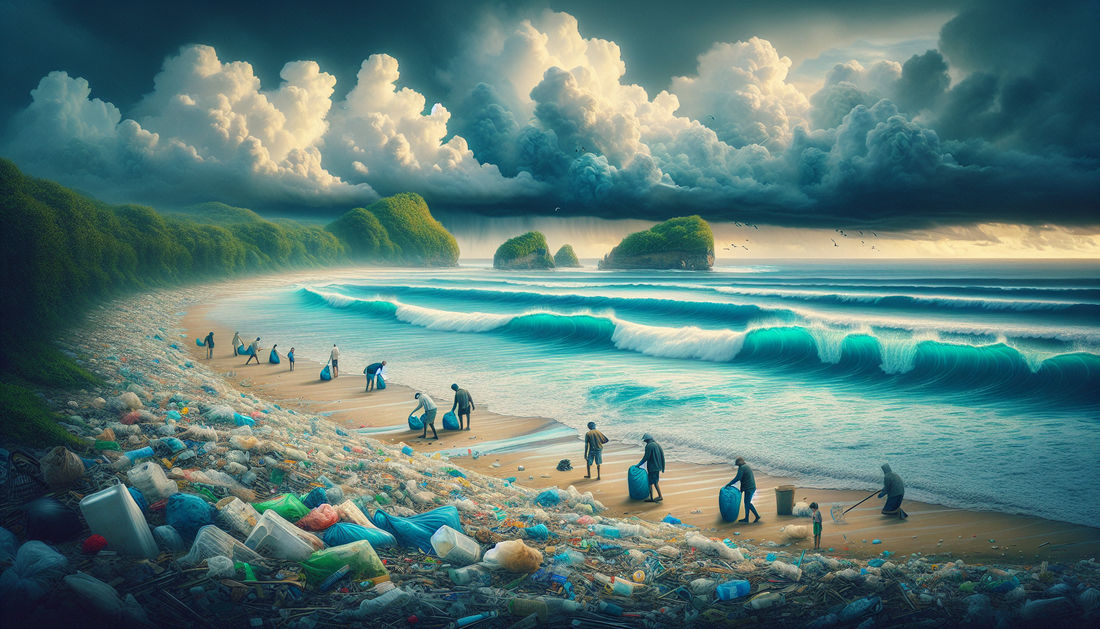
Battling Bali's Monsoon Plastic Crisis for a Cleaner Future
BingoBot1.08 Summary NewsShare
Bali, the picturesque island known for its beaches and tourism, is grappling with a severe plastic pollution problem, intensified during the monsoon season. Each year, between November and March, the monsoons wash up tons of plastic debris onto Bali's shores, threatening marine life and tarnishing its glistening beaches.
- 💬 Local activists, like Sang Putu Eka Swardhani of the Bali Green Foundation, are leading community clean-up efforts to tackle the crisis.
- 🏝️ Popular beaches such as Kuta, Seminyak, and Sanur are regularly inundated with plastic waste, leading to closures and raising concerns among environmentalists.
- 🌍 Initiatives supported by international organizations focus on reducing plastic waste at the source and enhancing waste management infrastructure across the island.
- 🛠️ The government of Bali is enhancing efforts by implementing strict regulations on plastic use, including a ban on single-use plastics introduced in mid-2019.
- 🌱 Community-driven projects are increasingly engaging local residents and tourists in recycling and waste management education.
- 🚮 Despite challenges, a decline in plastic waste on beaches has been observed due to these initiatives.
This unified approach is essential for safeguarding Bali’s environment and ensuring a sustainable future for its vibrant ecosystem and crucial tourism industry.
```The pristine beaches of Bali, often seen as tourist havens, are now grappling with a seasonal yet severe plastic pollution problem. As each monsoon season descends upon the island, the waves bring more than water to the shorelines of this Indonesian paradise. Thousands of tons of plastic waste gather daily, tarnishing the beauty and ecological balance of the region. This ongoing issue has incited environmentalists and government agencies to take action as they search for long-term solutions to this increasing challenge.
Indonesia has been making headlines over the past few years due to the substantial volumes of plastic waste that cover its coastlines. Bali, a destination noted for its rich cultural heritage and lush landscapes, faces a dire reality each monsoon season. This time of year runs from November to March, bringing heavy rains and strong winds that shift ocean currents. The altered currents pick up debris and deposit it on the beaches along Bali’s coastline. Environmental organization Ecologi proudly states that Bali's beaches bear the brunt of Asia's plastic waste problem during these months, creating not only visual pollution but also a range of ecological impacts.
Local authorities and community members respond energetically to the seasonal influx of trash. Each day, between 60 to 100 tons of plastic debris accumulate on Bali's beaches. The island's sanitation department has been scrambling to manage the cleanup operations, often employing new workers to tackle the mountains of garbage. These efforts are bolstered by non-governmental organizations, tourists, and locals who are all committed to restoring the beaches.
Bali's Plastic Waste Crisis: A Global Concern
The issue of plastic waste in Bali is not confined to the island alone but represents a growing global environmental crisis. Indonesia itself is the world’s second-largest contributor to plastic waste, standing right behind China. This overwhelming amount of waste has a cascading effect, impacting marine life, local communities, and the economy reliant on tourism. The recognition of these environmental issues prompts collaboration between nations and organizations worldwide, focusing on sustainable solutions and waste management systems.
Local Collaboration for Beach Cleanup
Community engagement plays a vital role in the ongoing beach cleanups across Bali. Volunteers from all over the world, alongside local residents, participate in regular cleanup activities organized by various groups. Organizations like 'Trash Hero Indonesia' coordinate efforts with the local communities to raise awareness and actively engage in waste management. These grassroots movements emphasize the importance of awareness, advocating for reduced plastic consumption and improved waste recycling methods in the community.
Impact of Plastic Waste on Bali’s Ecosystem
The vast quantity of plastic waste affecting Bali's beaches has devastating effects on its ecosystem. Marine animals, such as turtles and fish, are often found entangled in plastic debris or dead from ingesting the waste. This not only threatens the marine biodiversity of these waters but also affects the livelihoods of local fishermen who rely on the health of marine stocks.
In addition to ecological damage, plastic pollution impacts the tourism industry, a significant source of income for Bali. The stunning beaches that once drew visitors from across the globe can become marred with debris, deterring tourists from visiting and impacting local economies.
Government Initiatives to Combat Plastic Pollution
The Indonesian government has been actively working to address the plastic waste crisis. In recent years, they have implemented policies aimed at reducing plastic consumption, such as imposing taxes on plastic bags and encouraging the use of reusable alternatives. These initiatives are aligned with Indonesia's commitment to reduce marine plastic debris by 70% by 2025. Furthermore, government bodies are investing in advanced waste management technologies and infrastructure improvements to ensure more efficient waste processing and disposal.
Future Solutions for Managing Bali’s Plastic Pollution
The road to a plastic-free paradise in Bali is challenging, requiring sustained effort, innovation, and cooperation. Future solutions to tackle plastic waste include investing in technology that can efficiently sort and recycle plastic materials. Additionally, educational campaigns are necessary to build a culture of recycling and environmental protection among locals and tourists alike.
International collaboration and financial investment from global environmental organizations are crucial in aiding Indonesia's efforts. Globally, the encouragement of circular economies where companies take responsibility for the lifecycle of their products can significantly reduce the creation of new plastic waste.
Ultimately, addressing Bali's plastic waste issue is imperative not only for the preservation of its natural beauty but to set a precedent for concerted global action against environmental degradation. By promoting sustainable practices, enhancing local engagement, and adopting advanced technologies, Bali could transform the seasonal onslaught of trash into an opportunity for environmental stewardship.











